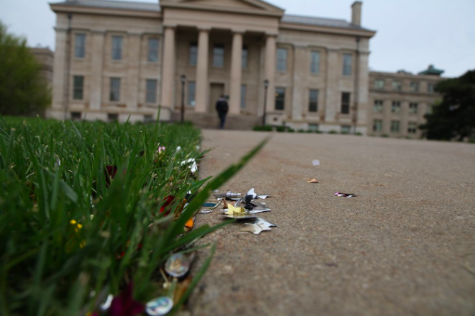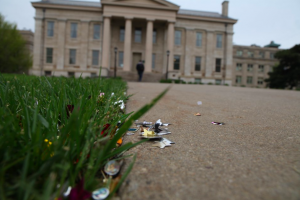Researchers look into a new treatment for myeloma
With the assistance of a grant from the U.S. Department of Defense, researchers at the University of Iowa will work to find a treatment for multiple myeloma.
The University of Iowa Hospitals and Clinics building is seen from the west on Wednesday, Nov. 8, 2017.
May 7, 2019
Thanks to a four-year, $1.52 million grant from the U.S. Defense Department, University of Iowa scientists will be able to conduct research based on their prediction that anti-CD24 antibodies could eliminate multiple myeloma tumor-initiating cells, which would potentially result in a cure or delayed mortality.
Multiple myeloma, a B-cell blood cancer caused by plasma cells that become cancerous and grow out of control, is rare but fatal and without a cure, said Fenghuang Zhan, a UI professor of hematology and oncology.
However, Zhan and his research partner, Gail Bishop, a professor of microbiology, believe that anti-CD24 antibodies could be the answer to decreasing the rapid spread of the cancer. Their research is the first to predict that CD24, a molecular protein, may be a factor of myeloma cancer cells.
Although there is still plenty of paperwork to be filled out before the Defense Department officially releases funds, Zhan and his research team are excited to begin developing a new treatment.
“Once we provide all the information, we can get started on Aug. 1,” he said.
For Bishop, the grant is important because there has been no increase in funding from the National Institutes of Health and the National Cancer Institute, despite a surge of interest in the study of immune-cell-based therapies and the immune system’s interaction with cancer.
RELATED: Alumna joins walk to raise awareness
“In fact, President Trump has proposed massively slashing the NIH budget overall for the past two years,” Bishop said. “It is increasingly difficult for any individual researcher or research project to be funded by the NCI.”
The Defense Department recently announced its interest in focusing in on very specific types of research, she said.
“In the past year, they announced that they were interested in B-cell cancers, which are the most common blood-cell cancers in people,” she said.
Bishop believes the increase in B-cell cancers has increased the most in veterans, probably because of chemical exposure during their time in service. Finding a reliable treatment for the increase in patients with myeloma is the top priority.
“Our discovery may have a bigger [impact] in the cancer society,” Zhan said.
UI assistant research scientist Ivana Frech, the manager of Zhan’s lab, will work alongside Zhan and Bishop in the next step of the research process, where the team will test anti-CD24 antibodies in mouse models.
“We will inject tumor cells and treat it with the antibody to make sure that the tumor does not progress,” Frech said. “We can see over time if we can increase the survival rate.”





















